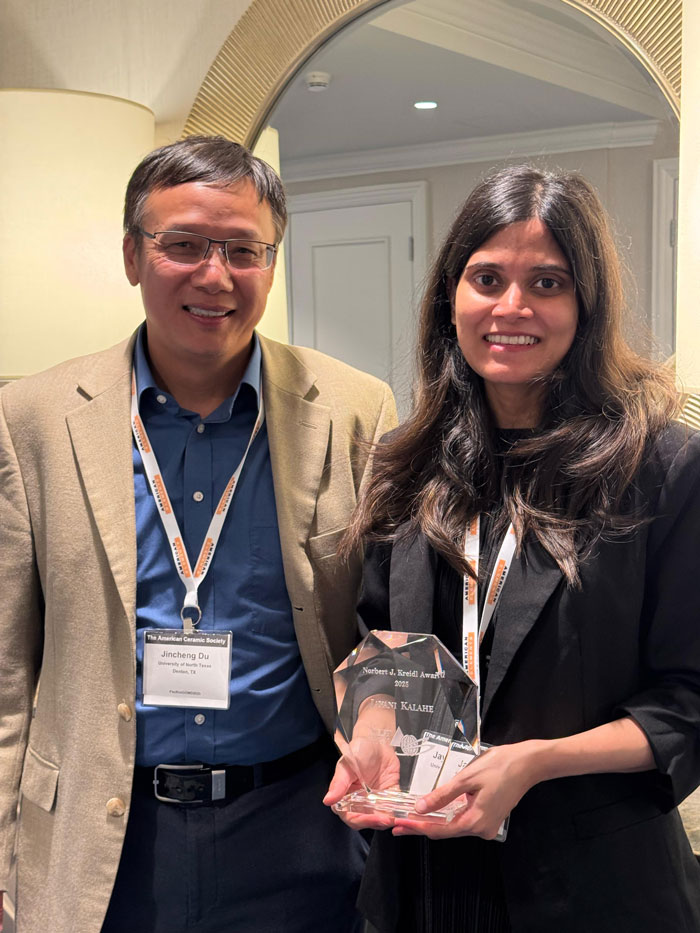Tuesday, July 29, 2025
 DENTON (UNT), Texas - As more countries turn toward nuclear energy, safely storing
radioactive waste is becoming an urgent matter. Jayani Kalahe (’24 Ph.D.) at the University of North Texas is studying what makes glass work as an option for storing that waste. Her research
has earned her international recognition from the American Ceramic Society as the sole winner of the 2025 Norbert J. Kreidl Award for Young Scholars.
DENTON (UNT), Texas - As more countries turn toward nuclear energy, safely storing
radioactive waste is becoming an urgent matter. Jayani Kalahe (’24 Ph.D.) at the University of North Texas is studying what makes glass work as an option for storing that waste. Her research
has earned her international recognition from the American Ceramic Society as the sole winner of the 2025 Norbert J. Kreidl Award for Young Scholars.
“It’s a huge honor. It gives me confidence that my work has contributed to research in a meaningful way,” Kalahe (pictured, right) said. “I’m proud to represent UNT and my research group on an international stage.”
Kalahe is a postdoctoral researcher in the College of Engineering’s materials science and engineering department. She works in professor and department chair Jincheng Du’s (pictured, left) lab.
“I actually got my bachelor’s in physics, so I didn’t have prior background in glass research initially,” Kalahe said. “But when I came across Dr. Du’s research on glass science, it sparked my curiosity and motivated me to learn more. He’s been very supportive since I joined the lab, and working with him has been a great experience.”
When she joined the lab, Kalahe was assigned her current project, which focuses on studying phosphate-based glasses and minerals as potential hosts for nuclear waste storage.
“On one side, we have the phosphate glass, and on the other, a monazite crystal structure. We want to see what changes when the two meet—including structural rearrangements, elemental diffusion, and interfacial bonding.”
Most regular glass, like the kind used in windows, is typically made from silica, while phosphate glass is made from phosphate units. This type of glass can also include metal oxides, such as iron. When more iron is added, the glass becomes more chemically durable, which makes it useful for safely and effectively storing radioactive waste.
“We want to know how these atoms are connected and bonded so that we can have a better understanding of why they have a higher durability, why they’re a better candidate for nuclear waste storage,” Kalahe said.
For her research, Kalahe uses molecular dynamics simulations to generate models of glass with varying percentages of phosphate and other metal oxides. She can then study the model’s visualized structure to understand how the glass is formed.
“It’s like tracing the structural story of how the glass is built, atom by atom, ”Kalahe said. “It’s my favorite part of the research.”
Kalahe has presented her research at multiple international conferences, earning two awards from the American Ceramic Society in 2023 and 2024, including first prize in a student poster competition and an Editor’s Choice award in the society’s journal. For the Norbert J. Kreidl Award, she presented her research at the Glass & Optical Materials Division Annual Meeting in Vancouver. Her research abstract was also featured in the society’s summer bulletin.
After finishing her postdoc, Kalahe hopes to continue to advance glass research.
“What I would love to do is build on what I have done so far,” Kalahe said. “I want to contribute to designing and developing new materials to make something meaningful.”
From UNT News – Research and Innovation